Resumen
Esta investigación descriptiva cuantitativa y cualitativa, estudió los principales componentes en relación a la personalidad y el comportamiento que presentan varones rcluidos con o sin condena por crimen pasional, del Programa de Reinserción Social del “Pabellón Libertad” de la Penitenciaría Nacional de Asunción, evaluando a 20 varones del Programa del Pabellón Libertad entre los años 2013-2014, aplicando entrevistas estructuradas y el Test de Cuestionario de Análisis Clínico (CAQ) a los integrantes de la investigación. Se utilizaron herramientas informáticas para el procesamiento de texto, permitiendo el análisis y la comparación de datos. La presente investigación ha demostrado que los individuos recluidos por crimen pasional del Programa de Reinserción Social del “Pabellón Libertad” de la Penitenciaría Nacional de Asunción, presentan un desajuste psicológico.
Referencias
Freud, S. 81981) Un siglo de Psi-coanálisis. En: Emilio Rodríguez. Barcelona: Sudamericana. 2. González de la Vega, F. (2003) Derecho penal mexicano, los delitos. Mé-xico: Editorial Porrúa.
Marchiori, H. (2005) Personalidad del delincuente. 6ª edición. México: Po-rrúa. Disponible en: https://biblioteca.uhis-pam.edu.ni/wp-content/uploads/2017/10/Personalidad-del-Delincuente-Hil-da.-M.-agrupado.pdf
Orellana Wiarco, O. (1985) Ma-nual de Criminología. México. Porrúa 5. Redondo, S. (2005) Perfilpsicoló-gico de los delincuentes sexuales. Persona-lidades violentas. Madrid: Pirámide.

Esta obra está bajo una licencia internacional Creative Commons Atribución 4.0.





